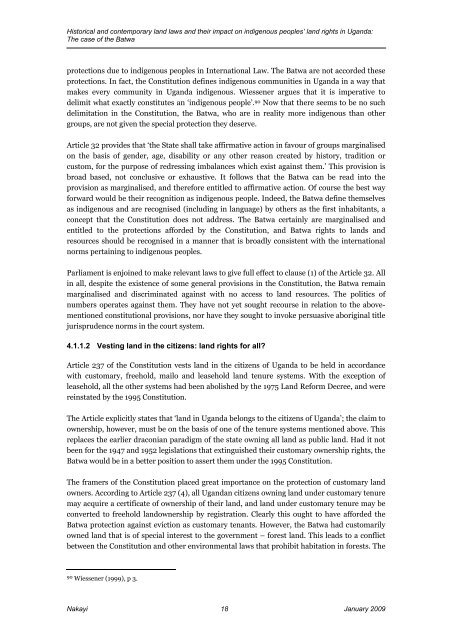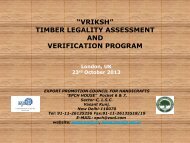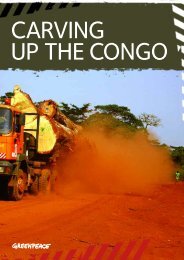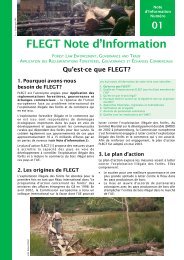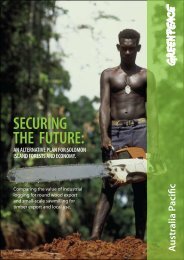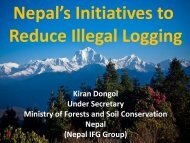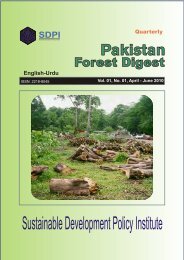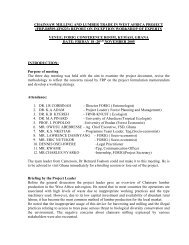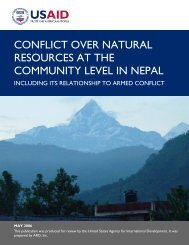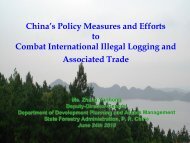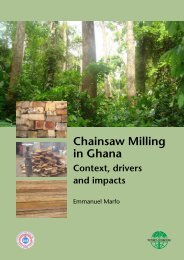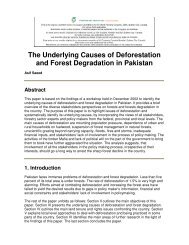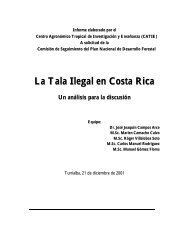download document - Rights and Resources Initiative
download document - Rights and Resources Initiative
download document - Rights and Resources Initiative
- No tags were found...
You also want an ePaper? Increase the reach of your titles
YUMPU automatically turns print PDFs into web optimized ePapers that Google loves.
Historical <strong>and</strong> contemporary l<strong>and</strong> laws <strong>and</strong> their impact on indigenous peoples’ l<strong>and</strong> rights in Ug<strong>and</strong>a:The case of the Batwaprotections due to indigenous peoples in International Law. The Batwa are not accorded theseprotections. In fact, the Constitution defines indigenous communities in Ug<strong>and</strong>a in a way thatmakes every community in Ug<strong>and</strong>a indigenous. Wiessener argues that it is imperative todelimit what exactly constitutes an ‘indigenous people’. 90 Now that there seems to be no suchdelimitation in the Constitution, the Batwa, who are in reality more indigenous than othergroups, are not given the special protection they deserve.Article 32 provides that ‘the State shall take affirmative action in favour of groups marginalisedon the basis of gender, age, disability or any other reason created by history, tradition orcustom, for the purpose of redressing imbalances which exist against them.’ This provision isbroad based, not conclusive or exhaustive. It follows that the Batwa can be read into theprovision as marginalised, <strong>and</strong> therefore entitled to affirmative action. Of course the best wayforward would be their recognition as indigenous people. Indeed, the Batwa define themselvesas indigenous <strong>and</strong> are recognised (including in language) by others as the first inhabitants, aconcept that the Constitution does not address. The Batwa certainly are marginalised <strong>and</strong>entitled to the protections afforded by the Constitution, <strong>and</strong> Batwa rights to l<strong>and</strong>s <strong>and</strong>resources should be recognised in a manner that is broadly consistent with the internationalnorms pertaining to indigenous peoples.Parliament is enjoined to make relevant laws to give full effect to clause (1) of the Article 32. Allin all, despite the existence of some general provisions in the Constitution, the Batwa remainmarginalised <strong>and</strong> discriminated against with no access to l<strong>and</strong> resources. The politics ofnumbers operates against them. They have not yet sought recourse in relation to the abovementionedconstitutional provisions, nor have they sought to invoke persuasive aboriginal titlejurisprudence norms in the court system.4.1.1.2 Vesting l<strong>and</strong> in the citizens: l<strong>and</strong> rights for all?Article 237 of the Constitution vests l<strong>and</strong> in the citizens of Ug<strong>and</strong>a to be held in accordancewith customary, freehold, mailo <strong>and</strong> leasehold l<strong>and</strong> tenure systems. With the exception ofleasehold, all the other systems had been abolished by the 1975 L<strong>and</strong> Reform Decree, <strong>and</strong> werereinstated by the 1995 Constitution.The Article explicitly states that ‘l<strong>and</strong> in Ug<strong>and</strong>a belongs to the citizens of Ug<strong>and</strong>a’; the claim toownership, however, must be on the basis of one of the tenure systems mentioned above. Thisreplaces the earlier draconian paradigm of the state owning all l<strong>and</strong> as public l<strong>and</strong>. Had it notbeen for the 1947 <strong>and</strong> 1952 legislations that extinguished their customary ownership rights, theBatwa would be in a better position to assert them under the 1995 Constitution.The framers of the Constitution placed great importance on the protection of customary l<strong>and</strong>owners. According to Article 237 (4), all Ug<strong>and</strong>an citizens owning l<strong>and</strong> under customary tenuremay acquire a certificate of ownership of their l<strong>and</strong>, <strong>and</strong> l<strong>and</strong> under customary tenure may beconverted to freehold l<strong>and</strong>ownership by registration. Clearly this ought to have afforded theBatwa protection against eviction as customary tenants. However, the Batwa had customarilyowned l<strong>and</strong> that is of special interest to the government – forest l<strong>and</strong>. This leads to a conflictbetween the Constitution <strong>and</strong> other environmental laws that prohibit habitation in forests. The90 Wiessener (1999), p 3.Nakayi 18January 2009


